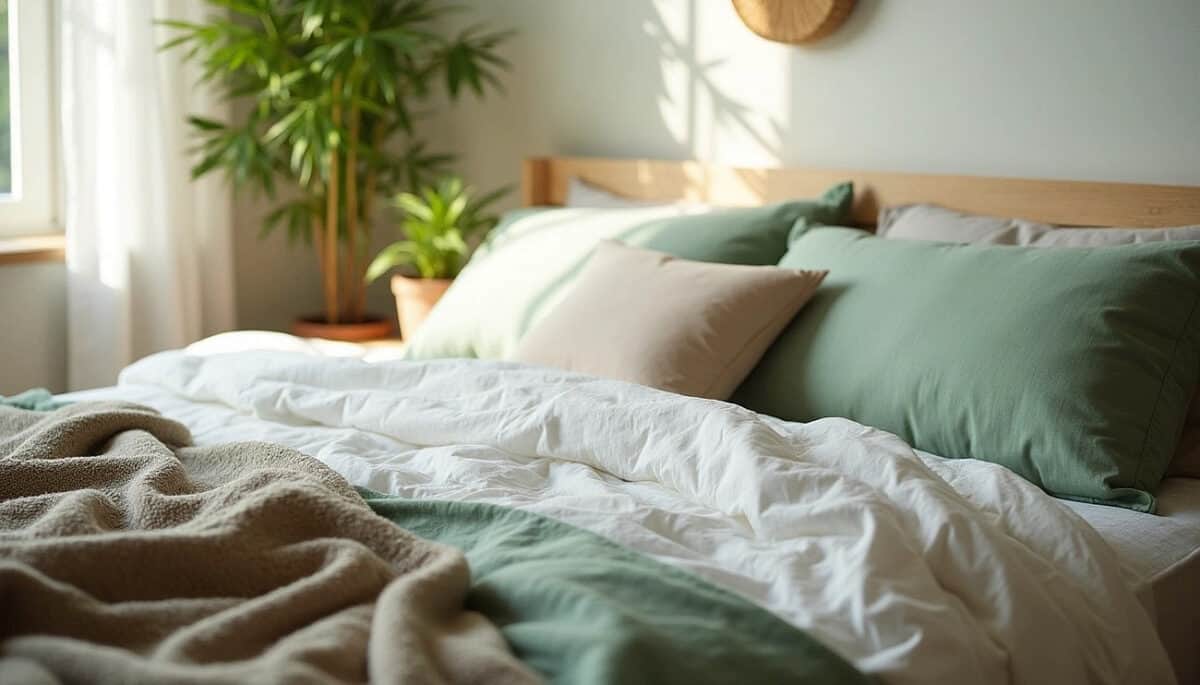Why Your Eco Bedding Choices Matter More Than You Think
Did you know your bedding choices impact far more than just how well you sleep? A single cotton T-shirt needs about 2,700 litres of water to produce – now imagine what goes into your entire bedding set!
It’s no surprise the sustainable bedding sector is growing 5.6 times faster than conventional options. When you choose eco-friendly bedding, you’re making a real difference to our planet. Organic cotton uses 88% less water and 62% less energy than regular cotton. And materials like bamboo? They’re superstars at absorbing carbon dioxide and releasing more oxygen than other plants, actually improving the air you breathe.

Your eco bedding choices don’t just help the environment – they directly benefit your personal health too. Sustainable materials are typically free from nasty chemicals and allergens, helping you sleep better and wake up feeling refreshed. This matters more than you might think, especially since you’ll spend about a third of your life snuggled up in bed!
Throughout this article, we’ll explore all the reasons your bedding choices really do matter, and how switching to natural eco bedding can transform both your sleep space and our planet. Ready to create a bedroom worth shouting about? Let’s dive in!
Why your bedding choices matter beyond just comfort
The textile industry ranks among the biggest polluters on our planet, with bedding playing a major role in this environmental challenge. Your choice of sheets and duvets isn’t just about creating a cosy sleep space—it sends ripples through our ecosystem and affects your personal health in ways you might not expect.
The hidden environmental cost of your bedding
Traditional cotton farming demands extraordinary resources, taking a heavy toll on our environment. Did you know that approximately 92 million tonnes of textiles, including bedding, end up in landfills each year? That’s like a garbage truck full of fabric being dumped every second.
Conventional cotton relies on harmful chemicals that damage soil and pollute water sources. These toxic substances have been linked to around 20,000 cases of cancer, birth defects, and miscarriages in communities near cotton farming regions. What’s more, the textile industry pumps out about 3.3 billion tonnes of greenhouse gas emissions annually.
Synthetic bedding brings different but equally worrying problems. Materials like polyester are petroleum-based, don’t break down naturally, and add to the growing crisis of microplastic pollution. Nearly 5 billion tonnes of microfibres have already built up in our oceans, with much of it coming from synthetic textiles.
Your bedding and the air you breathe
What many don’t realise is that your conventional bedding significantly impacts the air quality in your bedroom. That “new mattress smell”? It’s actually the off-gassing of volatile organic compounds (VOCs). These chemicals include:
- Formaldehyde (linked to asthma, allergies, and cancer)
- Flame retardants (which leak throughout the mattress’s life)
- Polyurethane foam (a petroleum-based material releasing VOCs)
- Boric acid (a developmental and reproductive toxin)
Your bedding can harbour dust mites, whose body parts and waste trigger asthma and allergic reactions. Even more concerning, your body heat actually increases VOC emissions while you sleep, turning what should be your personal sanctuary into a potentially harmful environment.
Given that you’ll spend about one-third of your life in bed, with your face in direct contact with pillowcases, breathing deeply, the importance of eco-friendly bedding becomes crystal clear. Sustainable bedding free from pesticides, synthetic dyes, and toxic substances provides a healthier sleep environment—especially beneficial if you have allergies or sensitive skin.
Which eco-friendly materials should you choose for your bedding?
Your choice of bedding material makes all the difference when creating a truly sustainable sleep space. Let’s explore the options that are kind to both you and our planet.
Organic cotton: The sleep-friendly classic
Compared to conventional cotton, organic cotton is a superstar – using 91% less water and 62% less energy. It’s grown without those nasty synthetic pesticides and fertilisers, which helps create healthier soil and supports local wildlife. Want to be sure you’re getting the real deal? Look for GOTS (Global Organic Textile Standard) certification – it’s the gold standard for sustainability and ethical production.
Organic cotton bedding isn’t just better for the environment – it’s actually stronger and more durable because it hasn’t been weakened by chemical processing. It’s also a dream for babies and people with sensitive skin, as it’s free from harsh chemicals and irritating detergents.
Bamboo and Tencel: Nature’s sustainable wonders
Bamboo is a true marvel – it grows incredibly quickly without needing chemical help. This wonder plant absorbs 11.5 times more carbon dioxide and produces 35% more oxygen than trees. Your bamboo bedding comes with built-in benefits too – it’s naturally antibacterial, hypoallergenic and brilliantly moisture-wicking.
Tencel lyocell, made from sustainably sourced eucalyptus wood pulp, uses a clever closed-loop production process that recycles 99.5% of water and solvents. But not all lyocell is created equal – always check that the brand uses responsible manufacturing practices.
Takeaway Tip: Bamboo bedding is perfect if you tend to get hot at night – its natural moisture-wicking properties help keep you cool and comfortable.
Recycled fibres: Giving materials a second life
Recycled materials rescue valuable resources that would otherwise end up in landfills. You can find bedding made from recycled cotton and polyester, with some innovative brands even turning plastic bottles into soft, comfortable sheets. This approach follows circular economy principles: buy better quality, choose products that break down harmlessly, and support clever manufacturers who repurpose waste.
Don’t be fooled by greenwashing
Watch out for misleading claims in the bedding world. Always look for specific certifications rather than vague “eco” labels. GOTS certification is the most trustworthy claim any bedding brand can make. Take a close look at the packaging too – excessive plastic wrapping completely contradicts environmental claims. And be wary of bedding with fabric softener coatings – authentic organic brands avoid these unnecessary additives.
Before you buy: Try to feel the fabric if possible. Genuine eco-friendly bedding should feel naturally soft without chemical treatments or fabric softeners.
Your eco-friendly bedding journey doesn’t stop at choosing the right materials. The production methods, working conditions, packaging choices and product lifespan all play crucial roles in determining how sustainable your bedding truly is. Let’s look at what really matters when creating a bedroom that’s kind to both you and the planet.
Is your bedding made ethically?
The most sustainable bedding brands prioritise fair wages and safe working conditions throughout their supply chain. Unfortunately, the textile industry has historically been linked with unfair labour practices. When shopping for your eco bedding, look for transparent companies that happily share details about their manufacturing processes.
Want to be sure? Check for these certifications:
- Fair Trade
- GOTS (Global Organic Textile Standard)
- OEKO-TEX
These independent organisations require strict compliance throughout the farming and manufacturing process, ensuring your bedding is made ethically from start to finish.
How is your bedding produced?
Energy efficiency matters more than ever as prices rise and governments introduce policies like the Climate Change Levy. Did you know motors and drives account for two-thirds of industrial electrical energy use, and can cost up to 100 times their purchase price over their lifespan?
The best bedding manufacturers now use closed-loop systems that recycle 99% of solvents, chemicals and water for future production batches. This clever approach reduces carbon footprint and minimises environmental impact. Some brands take this even further by powering their production with renewable energy.
What about packaging and shipping?
The environmental impact of your bedding doesn’t end at the factory door. Truly sustainable bedding should arrive in minimal, recyclable or compostable packaging. Some innovative companies are leading the way with reusable packaging solutions—like Devon Duvets, who deliver over 75% of their adult mattresses in specially-made reusable bags, saving over 5,000kg of single-use plastic.
Shipping methods matter too! Brands committed to sustainability often choose larger, more efficient vessels and offset carbon emissions from transport.
Will your eco bedding stand the test of time?
Your sustainable bedding should be built to last. High-quality, durable products that resist wear for years create far less waste than cheaper options needing frequent replacement. Bedding made from organic materials often proves stronger and more durable because it isn’t chemically processed.
Taking proper care of your eco bedding extends its lifespan even further—look for manufacturers who provide specific care instructions to help maintain quality over time. And at the end of its life? Truly sustainable bedding should be biodegradable or easily recyclable, with some companies even offering take-back programmes.
Making better choices as a consumer
Your shopping decisions can create real change in the bedding industry. Ready to make the switch to eco-friendly bedding? Here’s everything you need to know to make choices that are good for you AND the planet.
How to spot truly sustainable bedding
When shopping for eco bedding, look for these trustworthy certifications that verify environmental and ethical claims:
- GOTS (Global Organic Textile Standard) guarantees the fabric is organic and meets strict environmental standards
- OEKO-TEX certification ensures your bedding is free from harmful chemicals and has been tested for hundreds of regulated substances
- Fair Trade certification confirms workers received fair wages and safe working conditions
Don’t be fooled by vague “eco-friendly” claims! These specific certifications are your best assurance of genuinely sustainable products.
Questions worth asking before you buy
Before adding that gorgeous bedding set to your basket, ask yourself:
- What materials are used? Natural options like eucalyptus, bamboo, hemp, and organic cotton need fewer pesticides and less water
- How open is the brand about how they make their products? The best companies are proud to share details about their manufacturing process and energy use
- What happens when you’re finished with the product? Look for bedding that’s biodegradable or part of a take-back programme
Caring for your eco bedding to make it last
Your eco bedding will thank you for proper care – and so will the planet! Here’s how to keep it looking and feeling wonderful:
- Wash at low temperatures with gentle, eco-friendly detergents to save energy and extend the life of your fabrics
- Line-drying is your best eco option, though tumble drying on low heat works when needed
- For those inevitable stains, skip the harsh bleach! Try natural alternatives like white vinegar, lemon juice, or baking soda instead
Brands creating bedroom sanctuaries the planet loves
Some companies are leading the way in truly sustainable bedding. Ethical Bedding uses organic eucalyptus with impressive sustainability credentials. Panda London creates bamboo lyocell using a clever closed-loop manufacturing process that recycles up to 99% of water. Woolroom focuses on British wool, ensuring farmers receive fair payment.
These forward-thinking brands prove you don’t need to choose between luxury, comfort and sustainability – you can have all three in your bedroom sanctuary!
Your eco-bedding choices: Rest easy and make a difference
We’ve seen throughout this article that your bedding choices carry far more weight than simply providing a comfortable night’s sleep. The environmental footprint of conventional bedding—from excessive water consumption to chemical pollution—gives us plenty of reasons to think twice about what we’re sleeping on.
The impact doesn’t stop at environmental concerns. The health implications of conventional bedding can’t be overlooked, especially when you consider you’ll spend about one-third of your life in direct contact with these fabrics. Chemicals, VOCs, and allergens from traditional bedding directly affect your wellbeing, making sustainable alternatives not just planet-friendly but personally beneficial too.
Organic cotton, bamboo, Tencel, and recycled fibres all offer fantastic alternatives with significantly smaller environmental footprints. Finding truly sustainable options does require keeping an eye out for greenwashing, but trustworthy certifications like GOTS and OEKO-TEX provide reliable guidance when you’re shopping.
Remember, materials are just one piece of the sustainable bedding puzzle. Ethical manufacturing, responsible production methods, minimal packaging, and product durability all contribute to how eco-friendly your bedding really is. Asking the right questions before buying and properly caring for your bedding afterwards stretches these benefits even further.
The shift to eco-friendly bedding might seem like a small change at first, but its collective impact is huge. Each sustainable bedding set you buy represents thousands of litres of water saved, reduced chemical pollution, and fewer textiles heading to landfill. Plus, you’ll enjoy a healthier sleeping environment free from nasty substances.
Next time you need new bedding, remember that your choice matters—not just for your comfort, but for our planet’s future. After all, wouldn’t you sleep better knowing you’re making a positive difference while you dream?






